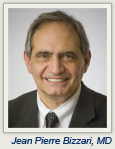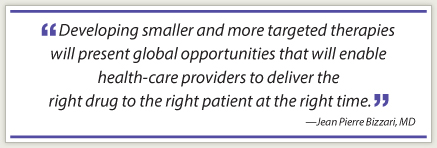 The synergy between industry, academic research, and regulatory bodies will play an increasingly important role in ensuring the future of a robust cancer drug pipeline. To gain insight on oncologic development trends, The ASCO Post recently spoke with Jean Pierre Bizzari, MD, Head of Global Clinical Oncology/Hematology for Celgene Corporation, a multinational biopharmaceutical company.
The synergy between industry, academic research, and regulatory bodies will play an increasingly important role in ensuring the future of a robust cancer drug pipeline. To gain insight on oncologic development trends, The ASCO Post recently spoke with Jean Pierre Bizzari, MD, Head of Global Clinical Oncology/Hematology for Celgene Corporation, a multinational biopharmaceutical company.
Bench to Bedside
Please describe the research and development process in the oncology sector.
At Celgene, the R&D mission begins and ends with the patient. To that end, our focus is on getting a deeper understanding of tumor biology and employing a translational approach to move that information from “bench to bedside,” in order to improve the specificity of therapies.
Much of our research is in biomarker development, which is the driving factor in targeted therapies. Two areas of particular interest to Celgene are immunomodulatory therapy, where we’ve developed thalidomide (Thalomid), lenalidomide (Revlimid), and pomalidomide, and the exciting new field of epigenetics, with azacitidine (Vidaza) and romidepsin (Istodax).
Moreover, our R&D efforts are centered on the emerging trend of turning cancer into a chronic disease. This effort mirrors some of the success we’ve had in difficult-to-treat blood cancers like myelodysplastic syndromes and particularly multiple myeloma. Through the use of novel therapies including lenalidomide and pomalidomide—we’ve seen survival for patients with these diseases move from a few years to 10 years, which was unheard of 15 years ago.
We are taking our success stories in immunomodulation and epigenetics, and applying these concepts to other blood cancers such as non-Hodgkin lymphoma and chronic lymphocytic leukemia. To put these advances into the pipeline, we currently have more than 30 ongoing phase III trials.
Smaller Patient Populations
Please discuss the future of Pharma in this emerging era of personalized medicine and targeted therapies, and how you plan to address the smaller markets in which these agents will be used.
There is no choice but to find scientific- and market-driven ways to adapt to the challenging but exciting new markets that are embracing the rapid advances in biology, genomics, and proteomics. In short, the markets are increasingly being based on patient- and disease-specific needs. Celgene is already in clinical trials with innovative approaches to address that changing landscape.
 For example, lenalidomide therapy in myelodysplastic syndromes is associated with a successful pharmacogenomic approach to identifying deletion 5q abnormalities in patients who, based on clinical evidence, will receive the maximum benefit. Furthermore, in diffuse large B-cell lymphoma—which affects a rather small patient population—we found that lenalidomide is more active in a subgroup with non–germinal center B cell–like disease (about half of that population). Being able to identify and deliver maximum clinical benefit to those patients is a major breakthrough.
For example, lenalidomide therapy in myelodysplastic syndromes is associated with a successful pharmacogenomic approach to identifying deletion 5q abnormalities in patients who, based on clinical evidence, will receive the maximum benefit. Furthermore, in diffuse large B-cell lymphoma—which affects a rather small patient population—we found that lenalidomide is more active in a subgroup with non–germinal center B cell–like disease (about half of that population). Being able to identify and deliver maximum clinical benefit to those patients is a major breakthrough.
In non–small cell lung cancer, we found a biomarker called SPARC (secreted protein acidic and rich in cysteine), and we are currently trying to determine if this marker predicts a positive outcome when patients are given albumin-bound paclitaxel (Abraxane).
Along with the changing market structure, developing smaller and more targeted therapies will present global opportunities that will enable health-care providers to deliver the right drug to the right patient at the right time, so that patients live longer and better lives.
New Endpoints and Trial Structures
We’ve seen growing interest in looking at new ways to structure clinical trials, in an effort to have a more robust drug pipeline. What part can Pharma play in this evolution?
A primary thrust in ensuring that we advance targeted agents is having productive discussions with the regulatory bodies about defining and developing new endpoints. Naturally, overall survival is the most meaningful clinical endpoint, but waiting from clinical trial randomization until death from any cause represents a protracted time lag that delays the process.
In order to leverage the emerging biologics, we need to focus on new trial structures such as adaptive design, in which the investigators frequently analyze the data to make necessary clinical adjustments and give the study a better chance of success. Given the small populations of oncology trials (compared to cardiovascular trials, which can have accrual of up to 25,000 patients), this is a significant need.
The other component that we feel will help move promising agents from phase II to phase III is the use of biomarkers, not only for greater efficacy but also to increase safety and avoid adverse events that might take patients off trial.
In this exciting new era of medical innovation, we need to increase access to these powerful new therapies that may help patients live longer and better lives. Therefore, collaboration among the biopharmaceutical industry, government, patient advocates, and cooperative groups, here and abroad, is key to our mission to improve the lives of patients worldwide.
Closing Thoughts
Any last thoughts about your career in oncology?
I began my career in oncology 30 years ago in France. I came to the United States and continued my work with many esteemed researchers. Looking back, those past 30 years show a remarkable path of advances that have saved countless lives.
I lost my father to colon cancer, and at the time he was battling the disease there was only one drug option. Now, in diseases like colon or breast cancers, we have five lines of active therapies. The key to this incredible 3 decades of progress has come largely from an ongoing cycle of innovation, driving scientific discoveries in the laboratory and delivering medically meaningful therapies to patients in need through rigorous clinical trials.
At Celgene, we believe that of all the critical trends that will advance the course of human health, innovation will be the most important. Innovation is the key to improving quality of life and reducing health-care costs. We continue to combine our scientific resources with an optimistic and energetic approach toward building and expanding on existing collaborations with other industries and government institutions, in an effort to bring promising disease-altering therapies to patients with cancer. ■
Disclosure: Dr. Bizzari is Executive Vice President of Celgene, on the scientific board of Transgene, and on the scientific board of the French National Cancer Institute.

